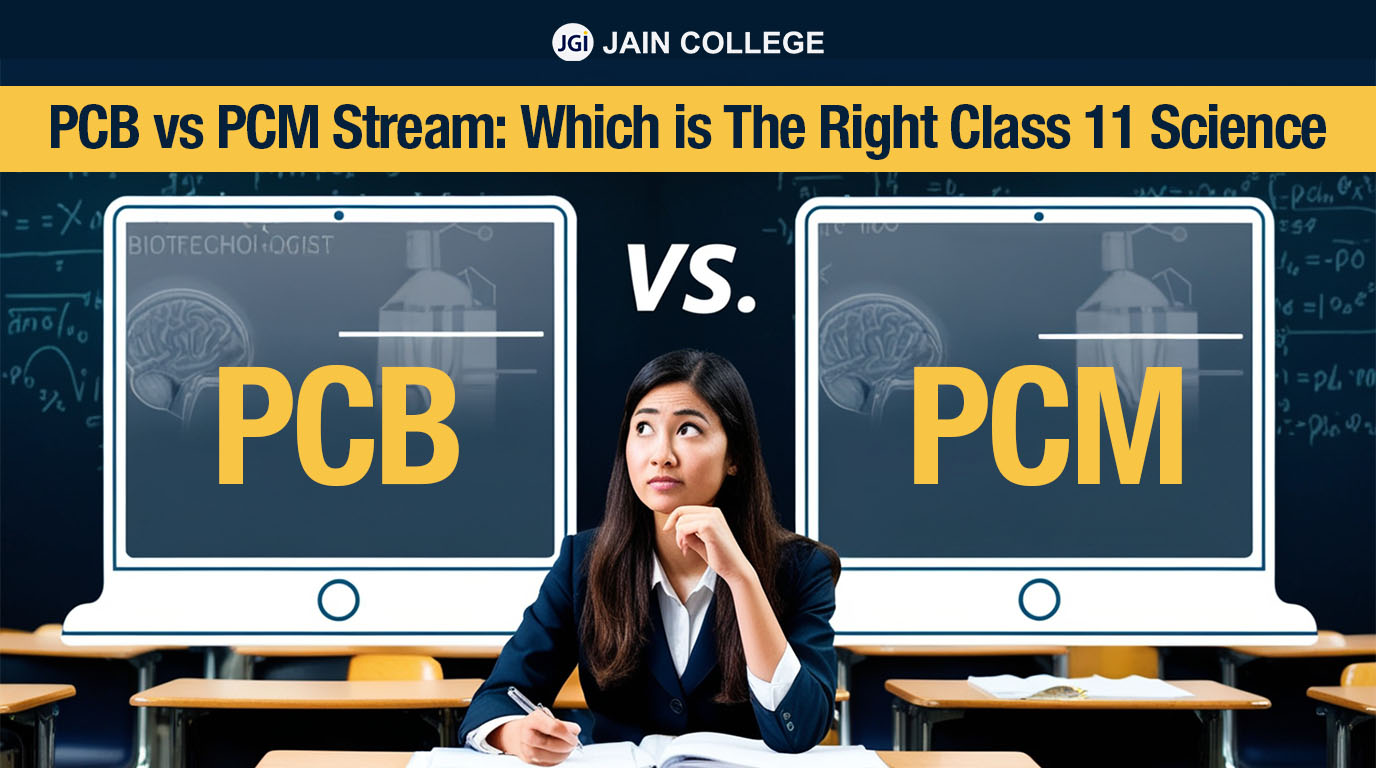
In the 11th grade, students opting for the Science stream in CBSE or PUC board have the option to choose the subject combination they wish to study in high school. PCB and PCM are the two primary subdivisions of the science stream in high school education. While PCB emphasizes life sciences and biological studies, PCM focuses on mathematical and physical sciences. Both streams open doors to a wide range of career opportunities, but they cater to different interests and skill sets. Understanding these streams is essential for aligning educational choices with long-term career goals.
While the student’s interests and understanding of the subject play a vital role in the subject choice, the subject combination influences the student’s eligibility for college programmes. Let us understand the subject combinations PCB and PCM and how to choose the stream for class 11.
In class 11, the compulsory subjects that are studied by students are Physics, Chemistry, English as a first language and a second language between Hindi, Sanskrit, French, and Kannada. Besides this, they can choose optional subjects between Biology, Mathematics, Computer Science and Statistics.
The PCB combination stands for Physics, Chemistry and Biology subjects. Generally, students who want to study courses such as medicine, biomedicals, biotechnology, environmental science etc., opt for the PCB combination.
Subjects Included
The PCB stream comprises the following core subjects:
Optional subjects may include Mathematics, Computer Science, or Physical Education, depending on the school’s curriculum.
Career Opportunities
The PCB stream is ideal for students interested in the field of life sciences and medicine. Popular career paths include:
Skill Sets Required
The PCM course stands for Physics, Chemistry and Mathematics subjects. Generally, students who want to study courses such as engineering, mathematics, astrophysics etc., opt for the PCM combination.
Subjects Included
The PCM stream comprises the following core subjects:
Optional subjects may include Computer Science, Physical Education, or Statistics, based on the school’s offerings.
Career Opportunities
The PCM stream caters to students interested in technology, engineering, and physical sciences. Popular career paths include:
Skill Sets Required
|
Category |
PCB |
PCM |
|
Eligibility |
Minimum 60% in class 10 |
Minimum 60% in class 10 |
|
Subjects |
Physics, Chemistry, Biology |
Physics, Chemistry, Mathematics |
|
Courses after 12th grade |
MBBS, BSc. Biology, Microbiology, Environmental Science, B.E, B. Tech |
BE, BTech., BSc., BCA |
|
Career Scope |
Medical Doctor, Pharmacist, Microbiologist, Genetist |
Engineer, Database Management, Operations Management, Research Analyst, Data Scientist |
|
Subject |
Syllabus (Class 11) |
Syllabus (Class 12) |
|
Physics |
|
|
|
Chemistry |
|
|
|
Biology |
|
|
|
Mathematics |
|
|
There is a third alternative for students who wish to study both Mathematics and biology - the PCMB. With this combination, students will study both Mathematics and Biology which gives them a wider range of college course alternatives. These students are eligible to study medicine and engineering. They will cover the syllabus that makes students eligible for competitive entrance exams such as NEET, JEE, and CET to name a few.
Interest and Passion
When students are applying for science programmes in class 11, they will be studying the course through the 11th and 12th. Balance your aptitude, interests and ambitions when deciding what subject combination you will choose. Choosing between PCB and PCM is a pivotal decision that requires careful consideration of your interests, strengths, and career aspirations. Both streams offer unique opportunities and challenges, and success in either depends on dedication and passion. By aligning your academic choices with your goals and interests, you can pave the way for a fulfilling and successful career.
PCM stands for Physics, Chemistry, and Mathematics.
A PCM student is someone who has opted for Physics, Chemistry, and Mathematics as their core subjects in high school or pre-university education.
PCM refers to the combination of Physics, Chemistry, and Mathematics, which is a prerequisite for pursuing engineering courses.
PCM includes Physics, Chemistry, and Mathematics. These subjects are commonly chosen by students aiming for careers in engineering, architecture, or technology-related fields.
The difficulty level of PCM depends on an individual’s interest and aptitude. Some students may find it challenging due to the analytical and problem-solving nature of the subjects.
Whether PCM or PCB is easier depends on a student’s interests and strengths. PCM is more analytical and requires strong problem-solving skills, while PCB involves extensive memorization and understanding of biological concepts.
PCB stands for Physics, Chemistry, and Biology.
PCB education refers to the study of Physics, Chemistry, and Biology, typically chosen by students interested in medical, life sciences, or biotechnology fields.
PCB is the combination of subjects required for appearing in the NEET (National Eligibility cum Entrance Test), which is an entrance exam for medical courses in India.
With PCB, students can pursue courses like MBBS, BDS, BAMS, BHMS, Biotechnology, Pharmacy, and other life science-related degrees.

JAIN PU College, a part of the renowned JGI Group, is committed to empowering students with quality education.
Beyond academics, the college ensures its online content reflects the same standard of excellence. Every blog and article is meticulously vetted and proofread by subject matter experts to ensure accuracy, relevance, and clarity. From insightful educational topics to engaging discussions, JAIN PU College's content is crafted to inform, inspire, and add value to its readers, reflecting the institution's commitment to intellectual growth and innovation.
View all Blogs